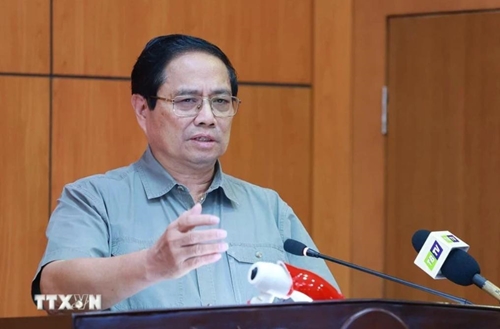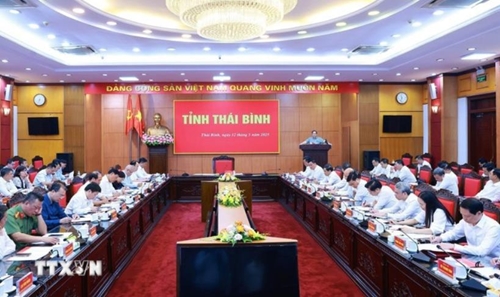Working with the provincial Party Committee’s Standing Board on May 12, the PM praised the province’s socio-economic achievements so far, which have greatly contributed to the country’s overall growth.
    |
 |
|
Prime Minister Pham Minh Chinh speaks at the event. |
Despite facing multiple challenges, Thai Binh has made significant strides across multiple sectors. The province recorded an average gross regional domestic product (GRDP) growth of 8.36% over the past five years.
In 2025, the province’s GRDP is expected to reach over 151.2 trillion VND (5.82 billion USD), a 1.7-fold increase compared to 2020. Inflation is under control, with the consumer price index (CPI) rising just 2.07% in the first four months of 2025 compared to the same period in 2024.
Agriculture has developed steadily with an increasing focus on high-tech, sustainable practices. Industry has expanded rapidly, driven by processing and manufacturing. Trade and services have also seen healthy growth. Foreign direct investment (FDI) between 2020 and 2025 has topped 5.4 billion USD, 14.5 times higher than the figure from the previous five-year period. State revenue has been on the rise, with collections in the first four months of 2025 reaching 67.2% of the annual target, up 60.8% year-on-year.
Administrative reforms have been accelerated, leading to a significantly improved investment climate. In 2024, Thai Binh ranked 15th in the Public Administration Performance Index (PAPI), 21st in the Satisfaction Index of Public Administration Services (SIPAS), and was among the top 30 in the Provincial Competitiveness Index (PCI).
The province is working to complete the eradication of temporary and dilapidated houses by June 20, 2025.
To continue its rapid development, Thai Binh requested the Government's approval of special mechanisms that allow the province to develop the Thai Binh Economic Zone into an open coastal economic zone. The province also seeks permission to launch a sea encroachment project, and financial support to study the development of Diem Dien Seaport and a key highway connecting Thai Binh city with Hung Yen province.
Additional proposals include the construction of a 1,500-bed general hospital and relocation of Thai Binh University of Medicine and Pharmacy to a new campus. The province also requested the inclusion of LNG-fired power projects in the national Power Development Plan VIII, land-use adjustments to convert rice land to non-agricultural purposes, and flexibility to pilot development models outside the currently approved provincial master plan, particularly with a view toward integration with new Hung Yen province after the mergence.
While recognizing the province’s efforts and achievements, PM Chinh noted that it has yet to fully tap into its distinctive potential, competitive advantages, and emerging opportunities. He pointed out that the province’s economic scale has remained relatively small with limited productivity and competitiveness. The transition in agriculture has been slow, while the industrial base is still dominated by small and medium-sized enterprises, and the service sector is underdeveloped.
The Government leader urged the province to come up with solutions to fully exploit and leverage its distinctive potential, outstanding opportunities, and competitive advantages.
    |
 |
|
An overview of the working session |
He emphasized the need to actively implement policies on the reorganization of administrative units and the building of two-level local administration model, while ensuring uninterrupted delivery of public services, particularly digital services. He recommended establishing provincial and grassroots-level public service centers to handle citizens and businesses' needs efficiently.
PM Chinh reminded Thai Binh to make good preparations for Party congresses at all levels, heading to the 14th National Party Congress. The PM also urged Thai Binh to fully implement four strategic resolutions on scientific and technological innovation; global integration; law-making and enforcement; and private sector development, which were stated in the Politburo’s relevant resolutions.
Thai Binh should work drastically for double-digit growth by revitalizing traditional drivers and tapping into new growth engines. He underscored the importance of developing strategic infrastructure, particularly transport networks, to enhance its regional and national connectivity.
Thai Binh must also ramp up administrative reforms by eliminating at least 30% of unnecessary business conditions, cutting administrative processing time and costs by at least 30%, and swiftly addressing obstacles to business operations. The PM also emphasized the importance of safeguarding national defense, political stability, and social welfare, stressing that economic growth must not come at the expense of equity or the environment.
He requested Thai Binh to continue to focus on building a clean, capable political system with strong leadership and accountability.
PM Chinh also asked for urgent work on sea encroachment and the open economic zone, smart hospitals, a smart university, and a 10-lane expressway directly linking Thai Binh to Hung Yen, thus facilitating internal and regional connectivity.
Source: VNA